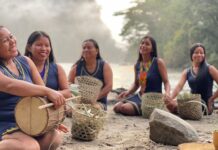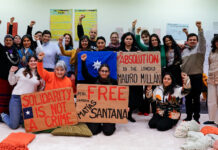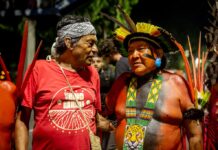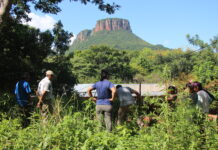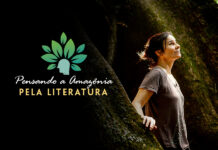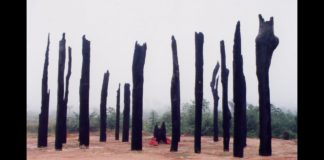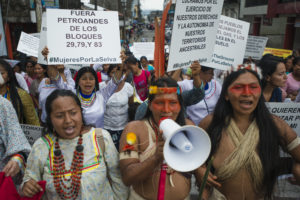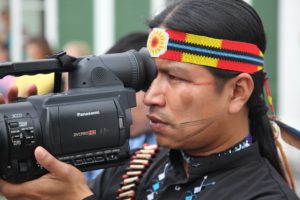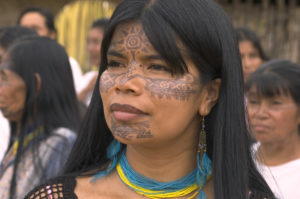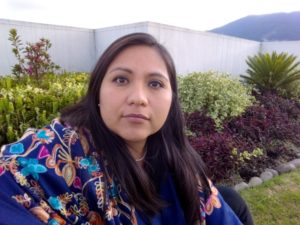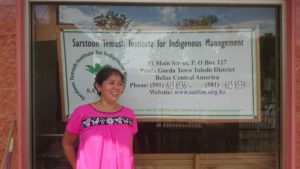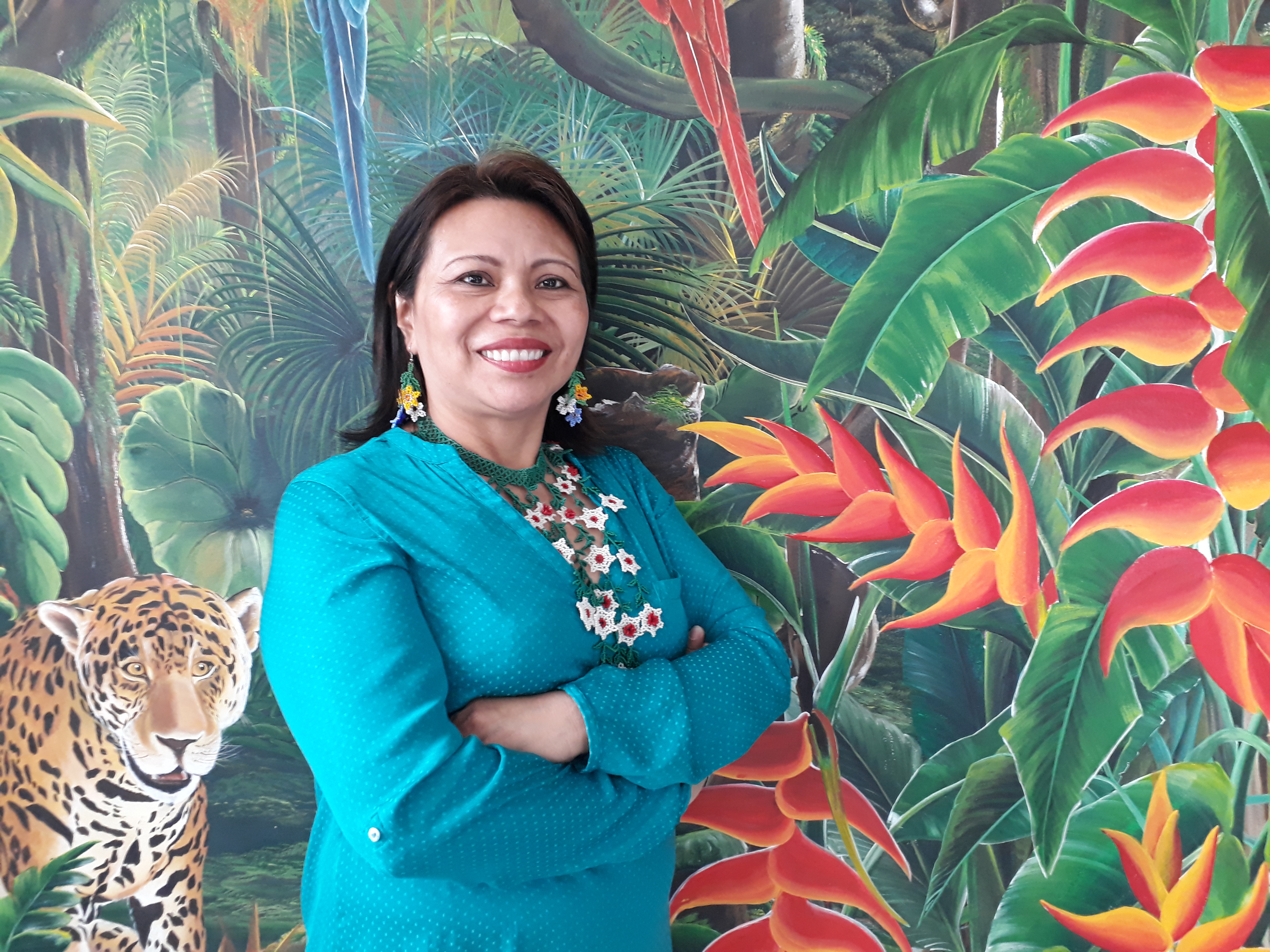
VOLA 5-1
Fany Kuiru, Colombia. © Maria Eugenia Caicedo 2017
VOLA 5-2
Froyla Tzalam, Belize. © Rachel Simon 2016
VOLA 5-3
Alicia Cawiya (front centre, with megaphone), International Women’s Day March, Puyo, Ecuador, 8 March 2016. © Mike Reich 2016
Eriberto Gualinga
Eriberto Gualinga, Sarayaku member and videomaker, Ecuador. © Zoë Tryon 2011 / Photograph reproduced courtesy of Amnesty International
VOLA 5-5
Ayme Tanguila, Ecuador. © Ayme Tanguila 2018
VOLA 5-6
Patricia Gualinga, Ecuador. ©Cristobal Corral 2005 / Fundación Pachamama
5. Indigenous peoples and the rights of nature
Abstract
In recent decades, indigenous people have displayed a new confidence and pride in their identity, using changes in the law at national and international level in order to defend themselves, their territory, and their culture, particularly against the extractive industries.
They have been engaging with aspects of mainstream Western culture such as higher education and communications technology, reaching beyond the borders of their country in a struggle that is becoming increasingly global.
Index
News related to this chapter
Yuturi Warmi, Ecuador’s first Indigenous guard led by Kichwa women
In 2020, over 40 Kichwa women began to organise themselves in defence of their territory and to expel mining from the Ecuadorian Amazon. This is how Yuturi Warmi, the first Indigenous guard led by women in the region began.
Moira Millán: urgent situation of Indigenous people in Patagonia
Moira and Vilma had travelled from southern Patagonia to Europe to spread awareness of the urgent situation for Indigenous peoples in the south of Argentina, and to strengthen bonds of international solidarity.
Kopenawa, Krenak, Kayapo
Brazil's Indigenous leaders are at last being recognized, reports Jan Rocha. But will anything really change in their 500-year-old struggle, as Brazil's Congress continues to defend the interests that seek to annihilate them?
Paraguay: the Paĩ Tavyterã and the changing climate
Paĩ Tavyterã Indigenous communities are employing ancestral knowledge and advocacy against the impacts of climate change
Eliane Brum: contemplating the Amazon, the centre of the world, through writing
In an extraordinary interview, Brazilian journalist Eliane Brum explains how language is fundamental to the life of the Amazon and its peoples
Videos
Brazil’s Uru-eu-wau-wau document COVID-19 victory with new video
The Uru-eu-wau-wau in Rondônia state sealed off their territory in March 2020. In a new video, they narrate how they survived the pandemic for more than a year with no major cases.
Brazil: Remembering the Eldorado massacre
Telling the story of a collective act of creativity -- to create a monument in memory of the 19 landless farmers killed on 17...
Visibility for pueblo Pumé
This video essay from LAB partner Ojos Ilegales Red, Venezuela, tells the story of Leonardo Milian Ruiz, a member of the Pumé community. Milian left his territory Boca Tronador, on Riecito in Apure State, near the the Venezuelan border with Colombia, after cattle ranchers continually invaded their territory.
Pumé
The Pumé people (sometimes called Yaruro) live in the savanna plains of Venezuela, the Llanos, located west of the Orinoco River. Most Pumé communities...
Cholet – the Work of Freddy Mamani, who built Salas de...
Documentary film, one hour long, showing the Salas de Eventos - over 60 in number - that have been designed and built by Freddy...
Linda Etchart is a lecturer in Human Geography at Kingston University, London. She has taught at Birkbeck College, University of London, and Anglia Ruskin University. She was an editor at Pluto Press, and a programme officer for the Commonwealth Secretariat.
Her published work is in the area of con-flict transformation and the role of indigenous peoples in global governance.Interviews
Interviewees
Alicia Cawiya (vice president of the Huaorani people): interviewed in Quito and Puyo, Ecuador, on 16 and 20 August 2016 by Linda Etchart and James Thackara. Translated by Linda Etchart.
Juan Ch’oc (Crique Sarco village): interviewed in Crique Sarco, Belize, on 14 October 2016 by Rachel Simon. Transcribed by Rachel Simon.
Eriberto Gualinga (Sarayaku Kichwa communications director/film-maker): interviewed in Sarayaku, Ecuador, on 20 August 2016 by Linda Etchart and James Thackara. Translated by Linda Etchart.
Patricia Gualinga (Sarayaku Kichwa activist): interviewed in Puyo, Ecuador, on 24 August 2016 by Linda Etchart and James Thackara. Translated by Linda Etchart.
Fany Kuiru (Tejedoras de Memoria): interviewed in Bogotá on 12 August 2016 by Gwen Burnyeat. Translated by Olivia Plato and Hebe Powell.
Eva Sánchez (Las Hormigas): interviewed in Intibucá, Honduras, on 26 October 2016 by Louise Morris. Translated by Louise Morris.
Ayme Tanguila (Kichwa architect and urbanist): interviewed in Quito on 27 August 2016 by Linda Etchart. Translated by Linda Etchart.
Froyla Tzalam (SATIIM): interviewed in Punta Gorda, Belize, on 10 October 2016 by Rachel Simon. Transcribed by Rachel Simon
References
NB: All web references were checked and still available in May/June 2018 unless otherwise stated.
Balch, O. (2013) ‘Buen vivir: the social philosophy inspiring movements in South America’, The Guardian, 4 February
Barrett, P.M. (2013) ‘Canada says ‘No thanks’ to Chevron pollution suit’, Bloomberg Businessweek, 2 May
Diamond, J. (2005) Guns, Germs, and Steel, 2nd edn, Vintage, London.
Etchart, L. (2018) ‘Ecuador, Chevron and the extractor’s curse’’, three-part article series, LAB, London, 17 September
Forst, M. (2017) cited in F. Martone, ‘Defenders of the earth and the environment’, Other News, 12 November
Galeano, E. (1971) Open Veins of Latin America, translated from the Spanish by C. Belfrage (1997), Monthly Review Press, New York.
Miller, T. (2003) ‘Ecuador: Texaco leaves trail of destruction’, Corpwatch
Further reading
General
Cullinan, C. (2010) ‘The Legal Case for the Universal Declaration of the Rights of Mother Earth’, Global Alliance for the Rights of Nature
Etchart, Linda (2014/2015) ‘Demilitarizing the global: Women’s peace movements and transnational networks’ in Rawwida Baksh and Wendy Harcourt (eds) A Handbook on Transnational feminist movements: Knowledge, power and social change. New York: Oxford University Press
Etchart, L. (2017) ‘The Role of Indigenouse Peoples in Combating Climate Change‘, Palgrave-MacMillan
Forst, M. (2017). ‘Situation of human rights defenders’, United Nations General Assembly
Global Witness (2018) ‘Deadliest year on record for land and environmental defenders as agribusiness is shown to be the industry most linked to killings’, Global Witness
Gudynas, E. (2011) ‘Buen Vivir: Today’s tomorrow’, Development 54(4), 441–447
Parker, A. (2018) ‘Latin America Deadliest Region for Environmental Defenders: Report’, Insight Crime
Riffo, L. (2017) ‘Fracking and Resistance in the Land of Fire’, Nacla Report on the Americas, Vol 49, No 4, Winter
Wearne, P. (1996) The Return of the Indian: Conquest and Revival in the Americas. London: Cassell/Latin American Bureau. Philadelphia: Temple University Press.
Additional resources by country:
Brazil
Arnold, C.F. (2018) The Third Bank of the River. New York: Picador
Yanomami, D. K. (2013) The Falling Sky: Words of a Yanomami Shaman. Cambridge, Mass: Belknap/Harvard University Press
Belize
Simon, R. (2017) ‘Belize: Conservation in the forest.’ Latin America Bureau
Simon, R. (2017) ‘Belize: Teechaz gat yuh bak’, Latin America Bureau
Tzalam, F. (2017) ‘Mapping on our terms’, Cultural Survival Quarterly, pp. 10-11
Colombia
Burnyeat, G. (2018) Chocolate, Politics and Peace-Building: An Ethnography of the Peace Community of San José de Apartadó, Colombia. Basingstoke, UK: Palgrave Macmillan
Casement, R. (1997) The Amazon Journal of Roger Casement. London, Anaconda Editions.
Farje, J. (2012) ‘The Putumayo Atrocities’, Latin America Bureau
Hardenburg, W. E. (1913) The Putumayo, the Devil’s Paradise
Hill, D. (2018) ‘‘The war goes on’: one tribe caught up in Colombia’s armed conflict’, The Guardian
O Siochain, S. (2011) ‘More power to the Indians’: Roger Casement, the Putumayo, and indigenous rights’, Irish Journal of Anthropology, 14 (2). pp. 5-12
Ramírez, M.C. (2011) Between the Guerrillas and the State: The Cocalera Movement, Citizenship and Identity in the Colombian Amazon. Durham: Duke University Press.
Tóibín, C. (2016) ‘Colm Tóibín on Roger Casement’, The Casement Project
Ecuador
Acosta. A. (2017) ‘Living Well: Ideas for reinventing the future’, Third World Quarterly. Vol 38, No 12.
Acosta, A. (2017) ‘Rethinking the world from the perspective of Buen Vivir’, Degrowth
Acosta, A. (2010). ‘Toward the Universal Declaration of Rights of Nature Thoughts for action.’ Global Alliance for the Rights of Nature
Arasim, E. (2016) ‘Mujeres Por La Selva – Indigenous Women of Ecuador Stand for an Amazon Free from Extraction on International Women’s Day’, Women’s Voices for Climate Justice
Becker, M. (2012) ¡Pachakutik! Indigenous Movements and Electoral Politics in Ecuador. Lanham: Rowman and Littlefield
Etchart, L. (2017) ‘One Woman Against Big Oil and Patriarchy’, New Internationalist
Etchart, L. (2018) ‘Ecuador, Chevron and the extractor’s curse’’, three-part article series, LAB, London, 17 September.
Febres Cordero, B. (2017) ‘In the Depths of the Ecuadorian Amazon, Digital Communications Aid the Process of Self-Determination’, NewsFrames
Gonzalez, D. (2018) ‘At Home in the Jungle, Everything Is ‘Alive and Has a Spirit’’, The New York Times
Melo, M. (2001) ‘How the Recognition of the Rights of Nature Became a Part of the Ecuadorian Constitution’, in The Rights of Nature: the case for a Universal Declaration for the Rights of Mother Earth. San Francisco: Global Exchange and Council of Canadians
Miller, T. C. (2003) ‘Ecuador: Texaco Leaves Trail of Destruction’, Corpwatch
Peel, N. (2011) ‘Blood of the Amazon by Nicola Peel – preview’, The Guardian
Riofrio, I. (2018) ‘Ecuador Sarayaku Leader Patricia Gualinga Defends Territory Despite Threats’, Mongabay
Sawyer, S. (2004) Crude Chronicles: Indigenous Politics, Multinational Oil, and Neoliberalism in Ecuador. Durham, NC: Duke University Press.
Vidal, J. (2010) ‘Andean Voices: Alberto Acosta’, The Guardian
Honduras
Ford, L. (2017) ‘We lost a great leader’: Berta Caceres still inspires as murder case takes fresh twist. The Guardian
Grandin, G. (2016) ‘Before her murder, Berta Caceres singled out Hillary Clinton for criticism’, The Nation
Malkin, E. (2017) ‘Who ordered killing of Honduran Activist? Evidence of broad plot is found.’ The New York Times
Pearce, F. (2017) ‘In Honduras, Defending Nature is a Deadly Business’, Yale Environment 360

